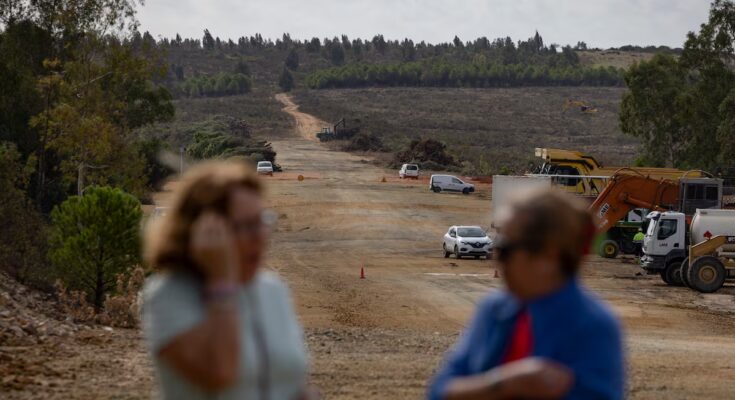Ombudsman Ángel Gabilondo has criticized the Andalusian Government (PP) for ignoring the inhabitants of Valdelamusa (Cortegana, Huelva) who will allegedly have a toxic mining waste pond just 700 meters from their homes, and whose work has already begun. The institution supports the request for help from the neighbors, who the regional executive has prevented from even filing charges in the trial because it does not consider them interested even if they live less than a kilometer from the pond, which will occupy 116 hectares of pine forests. Although the neighbors went to court and filed an administrative dispute against the council’s permits, the machines have already begun to destroy the pine trees in the area without waiting for final approval.
“It hurts me so much that I couldn’t go and see. We have a lot of hope and faith in the court. How is it possible that they started the work without waiting for the judge? Are they deceiving us?” asks Teodosia Morena, spokesperson for the Valdelamusa Viva association, which is fighting to move the mining lake as far away from her town as possible. The neighbors do not oppose the landfill, but instead ask the company to remove it from their homes to avoid the public health danger of having heavy metals accumulate for decades in the open air less than a mile from their homes. “They plan to cut down 36,000 pine trees, but now that they have started we hope that the court will react and paralyze it as a precautionary measure. Because they will quickly paralyze your house if necessary… I apply logic and I don’t understand it,” she adds frustrated.
The deposit of sludge containing dangerous heavy metals includes lead, arsenic or thalia, and with its 15 million cubic meters it is almost triple that of the Aznalcóllar pond (Seville), which 26 years ago discharged six million cubic meters of sludge at the gates of Doñana. The pond is expected to fill in the year 2041.
The Ombudsman’s resolution, issued a month ago, obliges the Andalusian government to listen to the arguments of a neighbor in the opposition, but extends it to all 400 inhabitants of the Huelva district who wish to contest. Last December, the Ministry of Energy, Industry and Mines authorized the company Minas de Aguas Teñidas (Sandfire Matsa) to build the waste basin because the one that currently accumulates mining sludge, started in 2007, will fill in 2026 after 19 years of discharges. But the Executive rejected the appeal of an interested neighbor citing “absence of legitimate interest” and for not appearing as an interested party in the procedure. Gabilondo now clarifies: “The presence of a legitimate interest has been asserted, in particular, the ownership of a house in the vicinity of the action subject to authorization (the mining lake),” we read in his letter.
The Andalusian government’s response has been to avoid making any statements while the work continues, on the pretext that the neighbor who appealed to the Ombudsman has initiated a controversial administrative appeal. “So the question is sub judice and we have to wait for the court’s decision,” says a spokesperson for the Executive. The lawyer of the complaining neighbor, Rafael Romero, warns: “There are more than 30 neighbors in the same situation who have not brought any dispute and the Ombudsman says that in all cases that go in the same direction, they have to go back to be able to file charges. I hope they make it happen.
This lawyer filed an administrative appeal against the environmental authorization in the contentious court number 1 of Huelva, and another against the authorization of the Ministry of Industry for tin which is in the contentious seat of the Superior Court of Justice of Seville. The territorial delegate of the Ministry of Sustainability who granted the environmental authorization for the field, Pedro Yórquez, has a brother who has been working in Matsa for more than a decade, according to eldiario.es.
Neighbors insist they are not against the mining basin, but rather the close proximity to their homes. “We are in favor of the mine continuing for another 100 years, but without a pond near our homes because we will be in danger. They have three further options, why don’t they choose them?”, asks Morena, who complains that the company did not want to meet the association. The group submitted more than 5,000 signatures against the project.
The company Minas de Aguas Teñidas, SA claims to have studied five alternatives to locate the pond and to have chosen the most expensive, with a cost of 60 million, “the best in environmental and structural terms”: “It is located on rustic lands of common nature, without affecting protected spaces or livestock paths. Not even the historical cultural heritage, nor public mountains, nor railways or public roads are affected”, responds a spokesperson for Sandfire Matsa. The first phase of construction of the pond occupies 57 hectares, of the total 116 hectares of the complete project. The mining company, purchased by the Australian Sandfire Resources and which operates three mines in Huelva with 4,000 direct and indirect jobs, assures that to compensate for the felling of pine trees, it plans to repopulate more than 175 hectares with 52,000 new pine trees.
Lawyer Romero disagrees with the mining company and does not believe that the chosen location is the most expensive: “It is infinitely cheaper than the rest of the alternatives, which are significantly more expensive and are further away from their facilities.”
In parallel with the Ombudsman, residents turned to the European Commission to investigate the Andalusian government’s authorization. However, a month ago Brussels concluded that the issue and the possible effects on the environment are the responsibility of the authorities of the country concerned, in this case the Andalusian government.
The company acquired years ago the land where the pond will be built, adjacent to the Valdelamusa district, which lacks particular urban and environmental protection, according to the mayor of Cortegana (4,800 inhabitants), on which the municipality depends. Together with the Valdelamusa Viva association, Ecologistas en Acción appealed against the environmental authorization granted because the chosen location would have affected a nearby reservoir in the event of the pond breaking.



